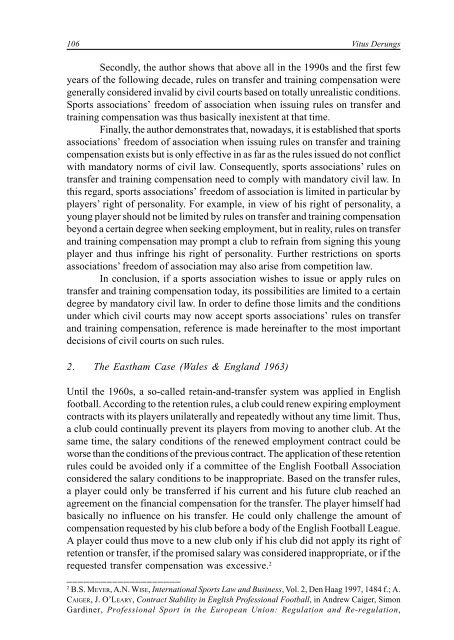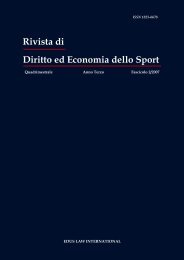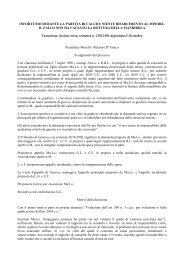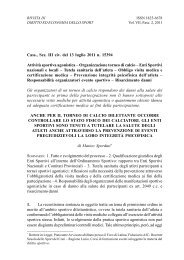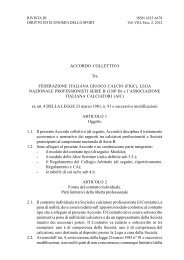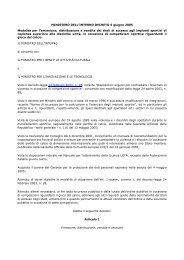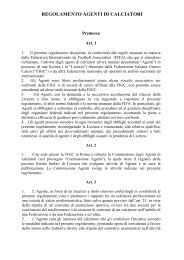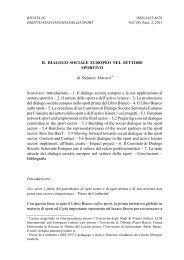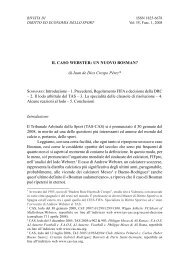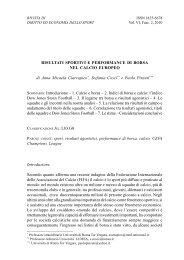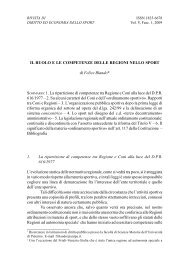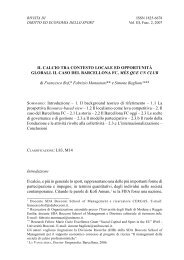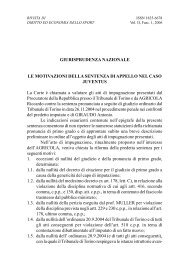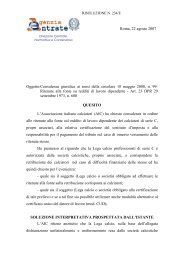European Sports Law and Policy Bulletin THE BERNARD ... - Slpc.eu
European Sports Law and Policy Bulletin THE BERNARD ... - Slpc.eu
European Sports Law and Policy Bulletin THE BERNARD ... - Slpc.eu
You also want an ePaper? Increase the reach of your titles
YUMPU automatically turns print PDFs into web optimized ePapers that Google loves.
106 Vitus DerungsSecondly, the author shows that above all in the 1990s <strong>and</strong> the first fewyears of the following decade, rules on transfer <strong>and</strong> training compensation weregenerally considered invalid by civil courts based on totally unrealistic conditions.<strong>Sports</strong> associations’ freedom of association when issuing rules on transfer <strong>and</strong>training compensation was thus basically inexistent at that time.Finally, the author demonstrates that, nowadays, it is established that sportsassociations’ freedom of association when issuing rules on transfer <strong>and</strong> trainingcompensation exists but is only effective in as far as the rules issued do not conflictwith m<strong>and</strong>atory norms of civil law. Consequently, sports associations’ rules ontransfer <strong>and</strong> training compensation need to comply with m<strong>and</strong>atory civil law. Inthis regard, sports associations’ freedom of association is limited in particular byplayers’ right of personality. For example, in view of his right of personality, ayoung player should not be limited by rules on transfer <strong>and</strong> training compensationbeyond a certain degree when seeking employment, but in reality, rules on transfer<strong>and</strong> training compensation may prompt a club to refrain from signing this youngplayer <strong>and</strong> thus infringe his right of personality. Further restrictions on sportsassociations’ freedom of association may also arise from competition law.In conclusion, if a sports association wishes to issue or apply rules ontransfer <strong>and</strong> training compensation today, its possibilities are limited to a certaindegree by m<strong>and</strong>atory civil law. In order to define those limits <strong>and</strong> the conditionsunder which civil courts may now accept sports associations’ rules on transfer<strong>and</strong> training compensation, reference is made hereinafter to the most importantdecisions of civil courts on such rules.2. The Eastham Case (Wales & Engl<strong>and</strong> 1963)Until the 1960s, a so-called retain-<strong>and</strong>-transfer system was applied in Englishfootball. According to the retention rules, a club could renew expiring employmentcontracts with its players unilaterally <strong>and</strong> repeatedly without any time limit. Thus,a club could continually prevent its players from moving to another club. At thesame time, the salary conditions of the renewed employment contract could beworse than the conditions of the previous contract. The application of these retentionrules could be avoided only if a committee of the English Football Associationconsidered the salary conditions to be inappropriate. Based on the transfer rules,a player could only be transferred if his current <strong>and</strong> his future club reached anagreement on the financial compensation for the transfer. The player himself hadbasically no influence on his transfer. He could only challenge the amount ofcompensation requested by his club before a body of the English Football League.A player could thus move to a new club only if his club did not apply its right ofretention or transfer, if the promised salary was considered inappropriate, or if therequested transfer compensation was excessive. 2____________________2B.S. MEYER, A.N. WISE, International <strong>Sports</strong> <strong>Law</strong> <strong>and</strong> Business, Vol. 2, Den Haag 1997, 1484 f.; A.CAIGER, J. O’LEARY, Contract Stability in English Professional Football, in Andrew Caiger, SimonGardiner, Professional Sport in the <strong>European</strong> Union: Regulation <strong>and</strong> Re-regulation,


